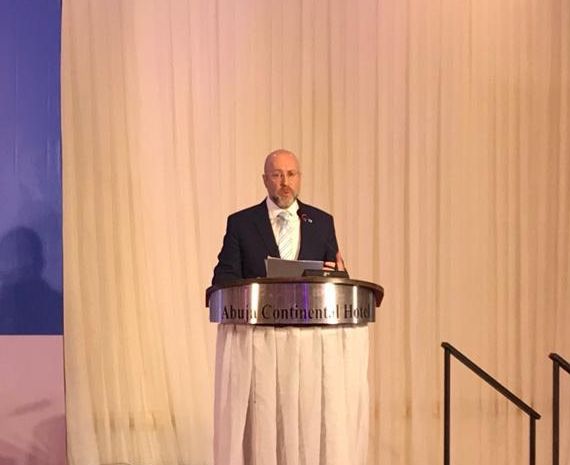FOREIGN NEWS
Envoy: US Has Invested $200 Million In Nigeria’s Food Security Over Last Five Years

The United States government stated that it has invested $200 million in Nigerian food security over the last five years.
The US government also announced that another $150 million in grants had been awarded to 33 Nigerian private sector companies.
The revelation was made by the US Acting Ambassador to Nigeria, David Greene at the 2024-2029 Global Food Security Strategy Launch.
He also announced that an additional $22 million has been invested in Nigeria’s cocoa value chain, which spans seven states.
The implementation of Nigeria’s Global Food Security Strategy is expected to boost agricultural productivity and drive agriculture-led economic growth over the next five years.
The envoy however said despite the support of the US government, Nigerians are best placed to solve the issues that affect them.
He said: “The U.S. government is providing broad assistance across Nigeria to support agriculture development. As Melissa mentioned, USAID invested almost $200 million in agriculture for the last five years to improve food security and build household resilience to shocks in Adamawa, Benue, Borno, Cross-River, Delta, Ebonyi, Gombe, Kaduna, Kebbi, Niger, and Yobe states.
” We also provided modest grants to 33 private-sector companies to leverage over $150 million in private-sector development, generated $306 million in domestic sales, and created over 23,000 jobs.”
“USAID is one of many U.S. government agencies promoting agricultural development in Nigeria. The implementation of Nigeria’s Global Food Security Strategy is expected to boost agricultural productivity and drive agriculture-led economic growth over the next five years.
“The investment improves rural livelihoods by increasing cocoa productivity, trade capacity, and traceability.
He lamented that “Nigeria is currently experiencing a severe food crisis due to insecurity, inflation, currency devaluation, the increased cost of inputs, trade restrictions, climate change, and post-harvest loss.
” In January 2024, Nigeria recorded an over thirty-five (35) percent increase in food prices, making it difficult for the 84 million Nigerians living below the poverty line to buy food. If we project out into the future, global food demand will double by 2050, and yet at the same time key staple crops are showing a decrease of up to 30 percent.
“Furthermore, while climate change is causing extreme weather conditions like drought and floods, it is even more challenging for smallholder farmers to increase yields and incomes.”
He said: “Ranked the sixth least prepared globally to confront climate change, Nigeria must focus on adaptation if food security is to be achieved.”
The envoy also noted that US and Nigeria are engaged in exchange programmes and fellowship which aimed at equiping Nigerians, adding that: “In the last two years, the U.S. Department of Agriculture has also sponsored more than a dozen scientific exchange fellows to study at U.S. agricultural universities and 30 private sector stakeholders to visit the United States, all so they can come back to improve Nigeria’s crop production, animal breeding, efficient pesticide use, and trade capacity. ”
He cited the case of one Agada Blessing, a Ph.D. student from the Joshua Sarwuan Tarka University in Benue State, a soil scientist that USAID supported to attend Michigan State University and develop her research on climate change and fertilizer use.
He stated that Blessing returned to Nigeria and has been sharing her research findings and organising training programmes on the importance of soil management for agricultural productivity, as well as training graduate students and government staff on soil management for maize production across Benue State and using her research to support the development of the first-ever state-level climate change policy in Kebbi and Ebonyi states.
He noted that: “Nigeria is a country of immense talent and potential. The potential to drive agriculture-led economic growth is endless. While the U.S. government and other partners are here to support Nigeria, Nigerians are best placed to solve the issues that affect them.
“However, for ideas to grow and drive economic development, the Nigerian government must create an enabling environment that supports private sector-led growth and entrepreneurship. U.S. companies and other U.S. private sector stakeholders are eager to help Nigeria improve agricultural productivity, trade, and food security. However, clear and transparent tax and investment rules are needed for meaningful growth.
“Food must be available to buy, and prices must be affordable for all Nigerians. The Nigerian government should embrace the adoption of genetically modified crops to boost the productivity and income of smallholder farmers while removing trade restrictions, including food and agricultural import bans. Competition and free trade fosters creativity and efficiency.
“Helping Nigerians to put food on the table can go a long way in rebuilding the reputation of the Nigerian government in the eyes of Nigerians.”
USAID Nigeria Deputy Mission Director, Sara Werth said Nigeria, like many nations, is grappling with the growing challenge of food insecurity.
She believes Nigeria’s diverse ecological zones and vibrant young population hold the key to a prosperous future.
She however said: “But to unlock this potential, we must join hands. t
-
CRIME3 years ago
PSC Dismisses DCP Abba Kyari, To Be Prosecuted Over Alleged $1.1m Fraud
-
FEATURED3 years ago
2022 Will Brighten Possibility Of Osinbajo Presidency, Says TPP
-
FEATURED2 years ago
Buhari’s Ministers, CEOs Should Be Held Accountable Along With Emefiele, Says Timi Frank
-
BUSINESS & ECONOMY2 years ago
Oyedemi Reigns As 2023’s Real Estate Humanitarian Of The Year
-
SPORTS1 year ago
BREAKING: Jürgen Klopp Quits Liverpool As Manager At End Of Season
-
SPORTS2 years ago
Could Liverpool Afford Kylian Mbappe For €200 million? Wages, Transfer Fee
-
ENTERTAINMENT2 years ago
Veteran Nigerian Musician, Basil Akalonu Dies At 72
-
FEATURED2 years ago
Tribunal Judgement: Peter Obi Warns Of Vanishing Electoral Jurisprudence, Heads To Supreme Court
-
BUSINESS & ECONOMY2 years ago
Oyedemi Bags ‘Next Bulls Award’ As BusinessDay Celebrates Top 25 CEOs/ Business Leaders
-
FEATURED3 years ago
2023 Presidency: South East PDP Aspirants Unite, Demand Party Ticket For Zone



































